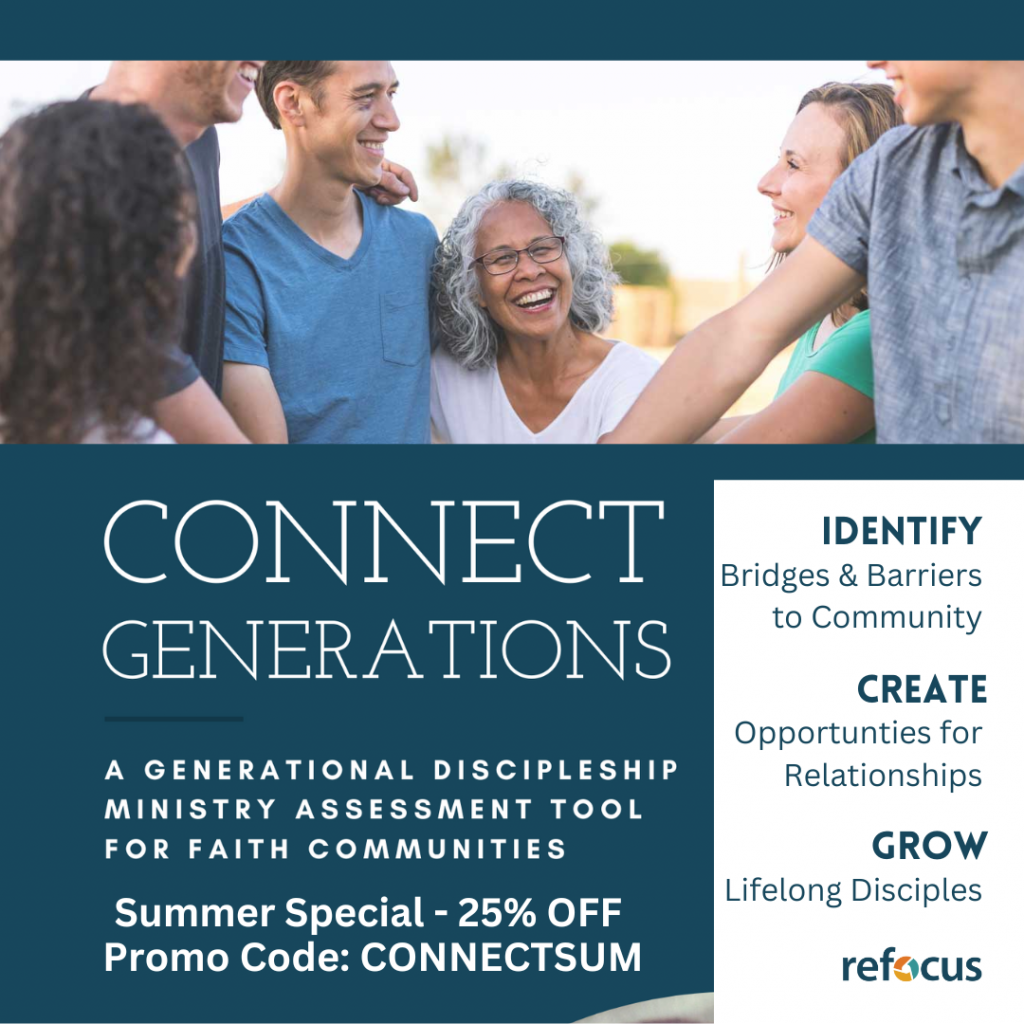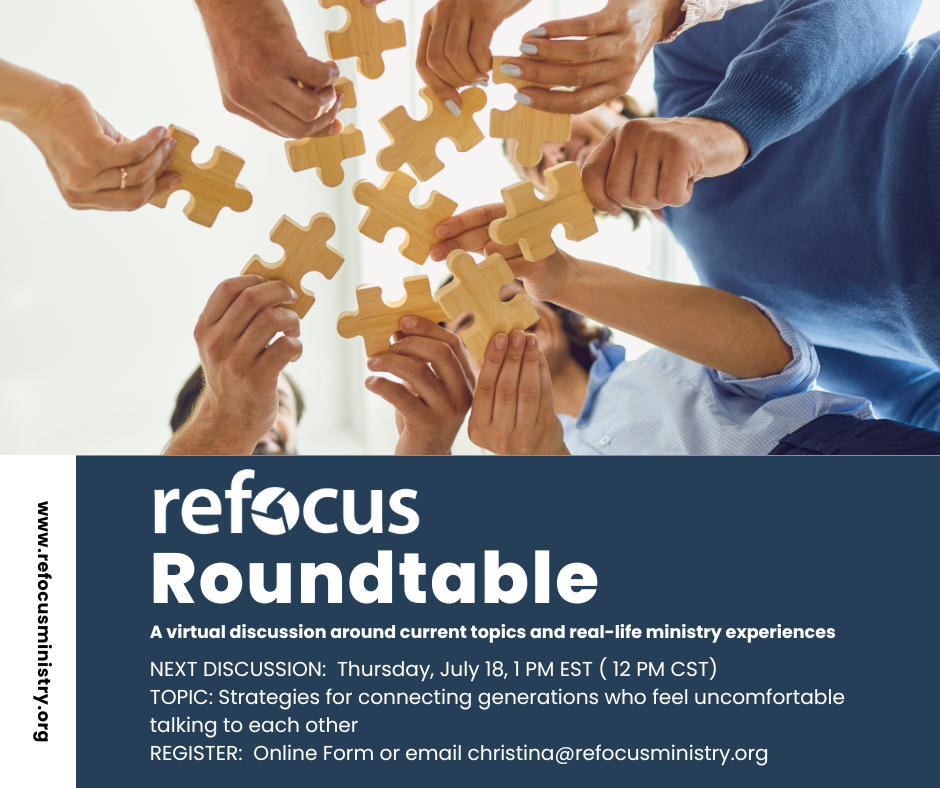
Earlier this week, I read a blog post talking about what children’s ministry will look like in ten years. Much of the author’s thoughts focused around technology, social media, and the changing family structure. But right in the middle of the blog, he states, “Kids will be searching for community” and goes on later to say “Children’s ministries that thrive will provide opportunities and strategies for kids to be in community through small groups, personal connections with leaders, and intentional ways to help kids get in community.”
While I may not agree with all of the author’s assumptions about the future of children’s ministry, I do think he hit the nail on the head with this one. Only I would take it a step further; I would say that that thriving children’s ministries will recognize that kids should be in community in all the ways mentioned but not limited to just children’s ministry.
So, let’s take it a step further. Let’s consider what children’s ministry could look like in ten years. And let’s do it with the research that has been done that demonstrates a growth in faith maturity, a longevity in faith adherence, and a continuation of faith formation long after a child has left childhood behind.
Kids & Faith Maturity
In 2010, Fuller Youth Institute released Sticky Faith research that demonstrated while there was no “silver bullet” churches that encouraged intergenerational connections and worship and youth that felt involved and connected to the larger church had a much greater chance of remaining in church post high school.
Dr. Kara Powell and Dr. Chap Clark, authors of Sticky Faith noted “Of the many youth group participation variables we examined, involvement in intergenerational worship and relationships had one of the most robust correlations with faith maturity” (Source).
In 2020, Awana partnered with Barna group to look at the resiliency of youth in church post-graduation. They discovered that when kids have a meaningful relationship with an adult in the church, they are twice as likely to have an ongoing relationship with the church. They are three times more likely to be engaged in Scripture including understanding the metanarrative of Scripture and integrating biblical principles in their life. They are twice as likely to say church matters to them, three times as likely to see church as a highlight, and three times as likely to read the Bible on their own. The conclusion drawn by the researchers at Barna Group? “The meaningful relationships individuals have as children fundamentally influence the stability of their future faith” (Source).
Future Children’s Ministry – The congregation is encouraged to connect with kids and families as they join the church and the children’s minister offers multiple avenues for interaction including prayer partners, mentors and apprentices, pew grandparents, extracurricular activities, and a variety of all-age service projects and celebratory events. The congregational vows spoken at baptism or dedication (depending on your tradition) are repeated yearly so the children can hear and understand the commitment made by their larger faith family to help them to know who Jesus is and what it means to follow Him.
Kids & Faith Longevity
In 2010 Lifelong Faith also released a study that showed 6 key factors in young adults remaining religious (affiliated with church and Christianity) – the first three applied directly to the family but the next three to the church, specifically supportive non-parent adults and personal religious experiences in the larger church, not just in youth group or children’s church (Source)
In 2017, Dr. Richard Ross, a professor at Southwestern Baptist Theological Seminary, asked that question. Specifically, he states, “The issue really is not: How is our youth group doing today? Instead, the core question is: How will our youth group be doing for a lifetime?” (Source). In answering that question, he proposed three needs that must be met for the goal of making disciples to be achieved. He based those three needs directly on Scripture consistent with the best current research concerning teenagers who follow Jesus for a lifetime. His “ministry in thirds” consists of…
- Parents/Caregivers who adore Jesus, love the church, and are actively on mission.
- An integrated community of believers where old and young interact in relationships and worship.
- A Bible-drenched peer group who actively live out the gospel together.
Future Children’s Ministry – The children’s minister will take a holistic approach to child discipleship by using the “ministry in thirds” approach and seek to create opportunities for families, congregation, and peers to have meaningful interactions and religious experiences as integral to development. Rather than the focus being primarily on the peer interaction with adult volunteers monitoring the interactions (traditional, lesson-based Sunday School), the focus will shift to equal parts of relational and discipleship experiences in all three areas with relationships as the goal rather than knowledge retention or attendance requirements.
Kids & Faith Formation

In 2017, The Journal of Intergenerational Relationships explained that intergenerational relationships create essential learning environments for all generations. Specifically, they found that three things are necessary for intergenerational learning, 1. There must be space to learn about one’s own generation with other generations, 2. All generations must act as learners and teachers at the same time, and 3. The learning must motivate participants towards in a particular way.
Additional research shows that “participation in intergenerational learning leads to greater involvement of participants in church life, including Sunday worship, sacraments, service projects, and the ministries of the church; also, participation in these all-age learning activities leads to a deeper understanding of the core events and practices of the Christian faith” (Source).
Future Children’s Ministry – Recognizing the benefits on intergenerational learning and experiences for all-ages but particularly for rising generations, the children’s minister will create opportunities for children to actively participate in whole-church experiences from Sunday worship to community service projects with the goal of allowing the children to not only learn, but also to lead as they are able, in order that the whole faith community might better understand and know God through one another. This can include times where the children may teach the older generations and vice versa.
I truly believe if we can “flip the script” of traditional approaches to children’s and youth ministry that tends to focus on a top-down, volunteer-heavy, separated-out experienced to one that is more collaborative, communal, and connected to the larger faith community and households/families, we will see a greater experience in faith formation, maturity, and longevity in ALL generations, not just the rising ones.
Imagine if in ten years, rather than spending 80-90% of our time in church separated from one another, we tipped the scale the other direction and spent the majority of our time together, growing in community, and worshipping God with one another. Then, those kids of the future who will be searching for community won’t have to look as far.
ReFocus Roundtable: Connecting Generations in Discussion Together
July 18, 2024 from 1 pm to 2pm, EST (12 pm CST)
The benefits of intergenerational relationships on both young and old have been enumerated by researchers and ministers alike but in many circles, there is resistance especially from adults. Many adults express that they feel uncomfortable engaging with younger generations. Offering the reticent a few tools for positive interactions can lead to opportunities that lead to meaningful relationships and lifelong discipleship.
We invite you to join us for this interactive conversation as our shared voices will help us all to connect generations in meaningful relationships for lifelong discipleship.
It’s Time To Connect

Connect Generations Coaching is a one-time intensive coaching experience that uses a research-based ministry assessment tool designed for churches to complete in less than a week.
This unique coaching experience offers specific insight into the barriers and bridges to connect generations and bring your community together. The Connect Generations Ministry Assessment Tool & Coaching Experience are available now for only $99.
About the Founder of ReFocus Ministry
Christina Embree is the founder and director of ReFocus Ministry. She holds a masters in ministry focused on Children, Youth, and Family Ministry and a doctorate in spiritual formation with a focus on age segregation and intergenerational ministry.
In addition to coaching churches of multiple denominations and traditions all around the globe, Christina serves as the Minister of Generational Discipleship for the Great Lakes Conference of the Brethren in Christ and as Next Gen pastor at Open Door Church in Lexington, Kentucky.
She is widely recognized as a speaker and author in the areas of generational discipleship, intergenerational ministry, and family ministry. As the mother of three children, she is familiar with the challenges of faith at home and pastoral ministry. She along with her husband Luke share a love for the church, their community, and the global work of peace and restoration through Jesus.
Interested in having Christina visit your church, speak at your conference, or coach your team?
Christina speaks on a wide range of topics related to children, youth, and family ministry with a unique focus on connecting generations for discipleship within your church. Her personalized approach allows you to pinpoint the needs of your community and gain the insight that you are looking for. Whether this is a volunteer team training and pastoral staff meeting or a ministerial conference, her experience and knowledge will help you determine the next step forward in creating lifelong disciples.




1 Comment
Lawson Murray
Excellent! I appreciate the succinct research summary and thoughtful conclusions. Well done! Dr. Lawson Murray https://childrensministrybasics.com/